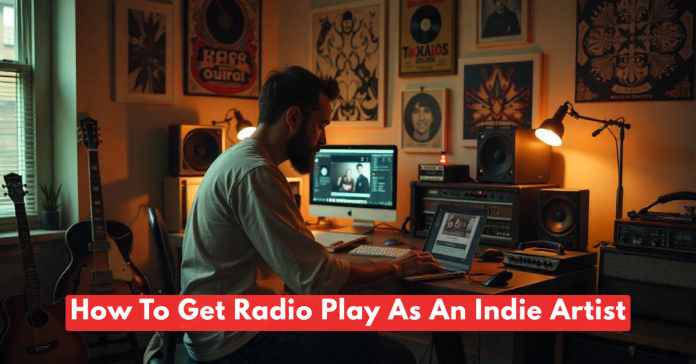Let’s face it – getting your music on the radio feels like trying to win the lottery while blindfolded. Trust me, I’ve been there, watching countless indie artists bang their heads against the wall trying to crack the radio play as an indie artist code. But here’s the real deal: it’s not impossible, just incredibly challenging.
The Cold Hard Truth About Radio
First things first: It would be rather unfair not to point out one issue that many people find rather obvious: FM radio remains one of the most challenging mediums for independent musicians to penetrate and get themselves popular. It is still the case that major stations harbor talent that might have been on air in the mid-90s while most of the commercial radio slots are owned by labels which have plenty of money to spend on promotion campaigns in the multiple of six figures. Well, do you still remember when that young man by the name Chance the Rapper rejected the labels, but still rose to fame and success? Well, that’s something like one in a million, ladies and gentlemen.
Why Radio Still Matters
You might think radio is dead in our streaming world, but here’s a plot twist: it’s still a massive music discovery platform. According to Nielsen, radio reaches 92% of Americans weekly – that’s more than any other medium. Getting radio play as an indie artist can:
- Introduce your music to thousands of new listeners instantly
- Build credibility (nothing says “I’ve made it” like hearing yourself on the airwaves)
- Help you land better gigs and festival slots
- Potentially grab the attention of industry professionals
The Reality Check: What You’re Up Against
Time for some tough love. It vital to understand that most of the major radio broadcasting operators are first and foremost commercial organizations and only secondly they are music enthusiasts. Advertisers have to be pleased, thus the mobile ring tones have to be predictable, popular tunes. Your experimental indie rock masterpiece? It is, nonetheless, may not be properly formatted to their format.
The Payola Problem (That Everyone Pretends Doesn’t Exist)
This is what no one tells you at the music school: although it is criminal to pay for the airtime for a particular song directly, there are what are known as “independent promoters who do exactly that. These promoters require huge amounts of money from major labels so it is quite amusing to see them pull such a loop and get their songs aired. As an indie artist, such a plan means that you are up against that machine.
Your Best Bets for Getting On Air
Now that we’ve established that getting radio play as an indie artist isn’t a walk in the park, let’s talk strategy. There are actually several paths to getting your music on the airwaves – some easier than others.
College Radio: Your New Best Friend
College radio stations are the most neglected and underestimated music players in today’s music market. This is because they are managed by music enthusiasts who are interested in unearthing new talents and not by those who want to stick to a playlist with 40 songs at most. Now, bands such as Death Cab for Cutie and Arcade Fire, also functionalities as College radio bands.
Here’s how to approach college radio:
- Research stations that play your genre
- Find the music director’s contact (not the general station email)
- Send a professional but personable pitch
- Follow up without being annoying
Internet Radio: The Wild West of Airwaves
Most internet stations have emerged and if you have not ventured into it, this has to be your easiest point of entry. Such programs as KEXP, NTS Radio, and thousands of others are always on the lookout for new material. The best part? They may have worldwide impact even though they are not major players in terms of funding.
The DIY Approach That Actually Works
Want to increase your chances of getting radio play as an indie artist? Here’s your battle plan:
Professional Quality is Non-Negotiable
While this is fine for your bedroom recording where you can record at your own comfort, radio requires professionally produced sound. Don’t scrimp on the mastering stage – it’s not the right location for cost-reducing. I have worked with many talented musicians only to lose their demos since it is quite embarrassing to work with a mix that is not fit for radio.
Build Relationships, Not Just Playlists
Radio programmers are people too. They get hundreds of submissions weekly. Stand out by:
- Engaging with their social media genuinely
- Attending industry events where they might be
- Supporting other artists they play
- Showing you understand their station’s vibe
Create a Radio-Friendly Version
That’s right; sometimes your twenty-seven minute double a side progressive rock epic requires a three minute pop edit. It is not a sell out but it is good use of tactics as stated beforehand. Well, the examples of bands who decided that taped music is enough – they are Radiohead and they are pretty good.
The Alternative Routes Nobody Talks About
Here’s where it gets interesting. Getting radio play as an indie artist doesn’t always mean traditional broadcasting.
Community Radio: The Hidden Gem
The majority of community stations has its own set of quotas as to the amount of local music to be played. If you are from the area then you are at a very good starting place here to begin with. Also, these stations include energetic audiences who, most likely, acquire the songs and attend live performances.
Satellite Radio: Worth the Shot
Likely, this philosophy is reflected in the fact that SiriusXM has channels to indie and unsigned musicians. Although it is challenging to penetrate this market more than internet radio they provide coverage for the entire country and even remunerate artists.
The Harsh Realities and How to Deal
Let’s be brutally honest – even with all these strategies, getting significant radio play remains tough. Here’s how to handle the challenges:
Rejection is Part of the Game
You’ll get ignored. A lot. Don’t take it personally. Even major artists face rejection. Perseverate and improve your style and the music that you use.
The Money Factor
Some promotional companies promise radio play as an indie artist for a fee. Be extremely cautious. Many are scams, and even legitimate ones can’t guarantee results.
Time Investment
Radio connections are evidently established over time beginning from months if not years. The concept of ‘it is not a sprint but a marathon’ simply tells that this is a long race rather than short one. A talented musician like the recent Billie Eilish did not come on the scene over night, there were preparations that went through behind the scenes .
Making the Most of Any Airplay
When you do get that coveted radio spot:
- Promote it everywhere (social media, mailing list, etc.)
- Thank the station publicly
- Track the results (website visits, stream increases)
- Use it as leverage for more opportunities
The Future of Radio for Indies
The landscape is changing. Today with integration with platforms and streaming, the difference between internet radio and traditional radio is very thin. This opens new opportunities for indie artists who are willing and able to follow the changed trends.
Podcasts: The New Radio?
Podcasts in general have come to be regarded as the New Music tastemakers. Appearing popular music podcasts can result to traditional radio interest.
Final Thoughts
Getting radio play as an indie artist in today’s music industry requires persistence, strategy, and a thick skin. It’s not the only path to success, but it’s still a valuable one. Remember, even if traditional radio seems out of reach, there are numerous alternative platforms eager to discover new talent.
Such advices would be to constantly come up with good music, thereby establishing close contacts, and most importantly never to give up. Your chance could happen at the utterance of the next play. Well, if everything goes sideways, you will at least have your great story about all the radio DJs who never showed up, mileage, you know.
Do not stop, continue, and one day you maybe will hear your voice as radio DJ when driving on a freeway. Until then, embrace the hustle. However, if there is one thing that can effectively counteract the damage done by any injury from an enemy, it is indeed success!

